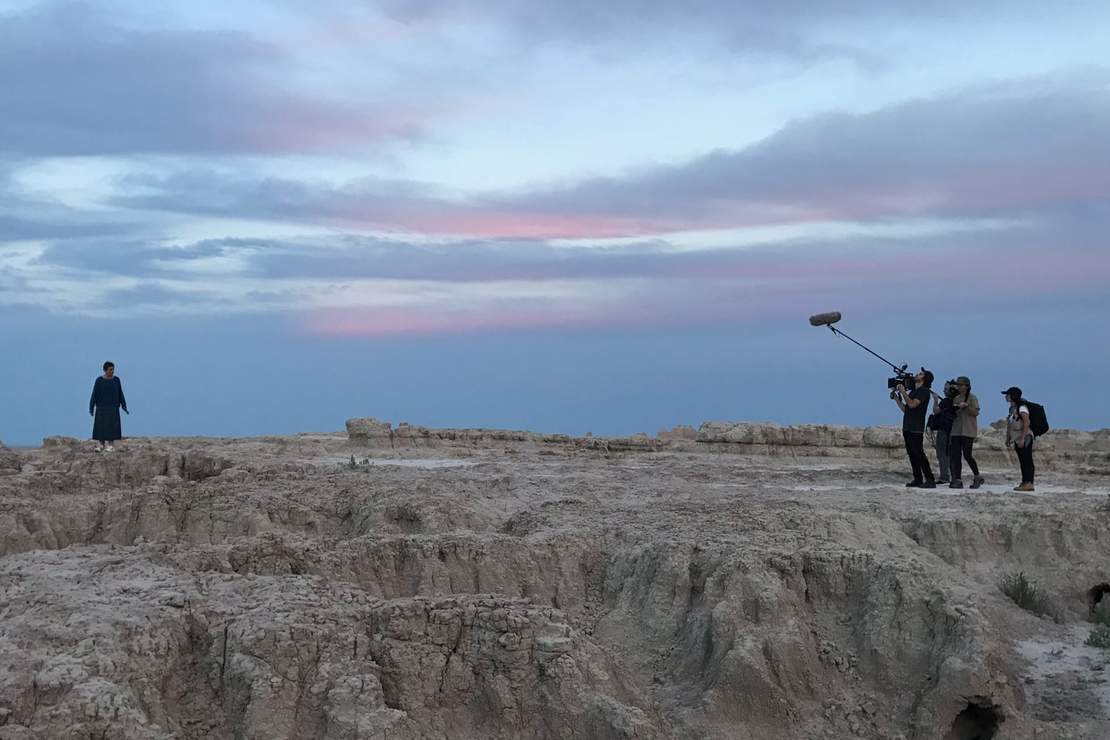오늘의 한마디
Merriam-Webster’s Word of the Year 2021

-
Word of the Year:
Vaccine
In everyday use, words are useful tools that communicate assertions, ideas, aspirations, and uncertainties. But they can also become vehicles for ideological conflict.
This is what happened to vaccine in 2021. The promising medical solution to the pandemic that upended our lives in 2020 also became a political argument and source of division. The biggest science story of our time quickly became the biggest debate in our country, and the word at the center of both stories is vaccine.
Hopes for cures and treatments of COVID-19 began as soon as the disease began to spread. Research into a new kind of vaccine containing messenger RNA, or mRNA, genetic material rather than an inactivated form of the virus was accelerated. After decades of studies conducted for application to diseases such as influenza, Ebola, and rabies, this new type of mRNA vaccine against the SARS-CoV-2 virus was rapidly developed, tested, and manufactured for broad use, with the first doses being administered in the U.S. in December 2020.
The use of a vaccine that triggers an immune response in an entirely new way required that Merriam-Webster revise and expand its entry for the word, which the company did in May. The definition, which formerly read “a preparation of killed microorganisms, living attenuated organisms, or living fully virulent organisms that is administered to produce or artificially increase immunity to a particular disease,” was replaced with the following:
1 : a preparation that is administered (as by injection) to stimulate the body's immune response against a specific infectious agent or disease: such as
a : an antigenic preparation of a typically inactivated or attenuated (see ATTENUATED sense 2) pathogenic agent (such as a bacterium or virus) or one of its components or products (such as a protein or toxin)
b : a preparation of genetic material (such as a strand of synthesized messenger RNA) that is used by the cells of the body to produce an antigenic substance (such as a fragment of virus spike protein)
Interest in the definition of this word was intense in the past year: lookups for vaccine increased 601% year-over-year from 2020. But interest in the word has been high since the start of the COVID-19 pandemic, with much discussion of the funding, development, testing, and ultimate distribution of the vaccines occurring in 2020. The prominence of the word vaccine in our lives in this era becomes even more starkly clear when we compare 2021 to 2019, a period in which lookups for the word increased 1048%.
Lookups of vaccine, already very high all year, jumped by 535% in August, long after discussions about vaccines began taking place in the press and widespread distribution in parts of the world were well underway. A number of stories in August show that discussions about policy, approval, and vaccination rates—rather than the vaccine itself—sent people to the dictionary. During this period, New York and California instituted vaccine mandates for health care workers; a federal mandate was announced for nursing home staff; an announcement of plans for booster shots for the general public in the U.S. prompted condemnations of inequities in vaccine distribution; and full FDA approval for Pfizer’s vaccine was granted.
This new higher rate of lookups since August has remained stable throughout the late fall, showing not just a very high interest in vaccine, but one that started high and grew during the course of 2021.
Vaccine comes from the Latin word for “cow,” vacca, because the term was initially used to refer to inoculation using doses of cowpox that, it was discovered, protect humans against smallpox. This word is a relatively recent one in English, dating back to the 1880s. See more on how vaccines work.
The word vaccine was about much more than medicine in 2021. For many, the word symbolized a possible return to the lives we led before the pandemic. But it was also at the center of debates about personal choice, political affiliation, professional regulations, school safety, healthcare inequality, and so much more.
Few words can express so much about one moment in time.

1/10:
Insurrection
Photo: Tyler Merbler
The violent events of January 6th led to a striking spike in lookups for insurrection, driven by headlines like this: “Military Joint Chiefs condemn 'sedition and insurrection' at US Capitol" (CNN, 1/13/21). Another, smaller spike took place in July, when the U.S. House select committee hearings on the event began.
The intensity of the news coverage and interest in this story, combined with its uncertain political, legal, and criminal implications, made the definition of this word the object of sudden interest. Other words looked up at this time included coup d’état and riot, but insurrection became the word most used by some politicians and the press.
The definition of insurrection is "an act or instance of revolting against civil authority or an established government."
Insurrection came to English through French, from the Latin verb insurgere, meaning "to rise against" or "to insurge." It has the same roots as the word insurgent, meaning "a person who revolts against civil authority or an established government," with the ultimate Latin root giving us surge.

2/10:
Perseverance
The word perseverance shot to the top of our lookups in February after NASA’s Mars rover “Perseverance” landed safely on the red planet on February 18th. The rover got its name thanks to student Alexander Mather, the seventh grader who submitted the winning entry to NASA’s "Name the Rover" essay contest. The name, chosen out of 28,000 entries from K-12 students from every U.S. state and territory, is apt: Perseverance traveled almost 300 million miles over seven months—a remarkable journey.
The word perseverance is defined as “continued effort to do or achieve something despite difficulties, failure, or opposition; the action or condition or an instance of persevering; steadfastness.” It’s ultimately from Latin persevērāre, meaning "to persist in a course of action or an attitude in spite of opposition, keep on.”

3/10:
Woke
Lookups for woke saw dramatic increases several times in 2021—first in April (they were up 1,373% on April 6th), then in May (up 1,279% on the 4th), and again in June (up 354% on the 24th). But it was during November’s election that the most dramatic increases occurred: lookups for woke were up 4,303% on November 8th in response to use of the word in election coverage.
The use of woke drawing interest is a new one, compared to the word’s historic use as the past tense form of wake: originating in in African American English (AAE), the new use of woke is defined in our dictionary as “aware of and actively attentive to important facts and issues (especially issues of racial and social justice).” The semantics of the newer use are, however, evolving, and it’s increasingly used as a general pejorative for anyone who is or appears to be politically left-leaning; the spikes in lookups mentioned above all correlate to instances in which reactions to racial and social injustice were dismissed as being “woke.”
The neologism wokelash combines this pejorative use with the word backlash to pin Republican political gains on a perceived adverse reaction to “woke” politics.
(See more on the history and use of woke.)

4/10:
Nomad
Photo: Photo Courtesy of Searchlight Pictures 2020 20th Century Studios All Rights Reserved
When the movie Nomadland snagged three of this year’s Oscar Awards on April 25th, including Best Picture, Best Actress in a Leading Role, and Best Directing, lots of people turned to Merriam-Webster.com to look up the word nomad—enough people to make lookups jump 4,625%.
Nomad can refer specifically to a member of a people who have no fixed residence but who move from place to place, usually seasonally and within a well-defined territory, or more broadly to someone who roams about. Nomad comes from the Latin word meaning “member of a wandering pastoral people,” and ultimately from the Greek verb that means "to pasture, graze (flocks)."

5/10:
Infrastructure
Lookups for infrastructure spiked 677% on April 7th, following President Biden’s announcement of his $2.3 trillion dollar plan. Subsequent spikes came in June with the announcement of a bipartisan agreement in congress on the legislation, and in November following former President Trump’s comments disparaging Republican legislators who voted for the bill and again after President Biden’s signing ceremony.
Sustained interest in this term was evident in public debates over what constitutes infrastructure and whether the word can be used to refer only to physical building and improvements to such things as roads and bridges, as opposed to some other elements of the proposal, such as broadband internet development and elder care funding. The debate was over the definition of the word itself.
The Latin roots of infrastructure mean simply “underneath or below the structure." This word came to English from French, and is a relatively young word in English, dating to the mid-20th century. It was initially widely used in the context of building military bases, railroads, and airfields for use by NATO forces following World War II.

6/10:
Cicada
Lookups for cicada were high for much of the spring and summer, as adult members of Brood X (as the particular group of periodic cicadas emerging in 2021 was called) made their way to the Earth’s surface, their larvae having been living underground for the past 17 years. Lookups were especially pronounced in May and June, when we saw increases of 1,442% and 264%, respectively.
The word cicada is defined as “any of a family (Cicadidae) of homopterous insects which have a stout body, wide blunt head, and large transparent wings,” and came to English from Latin, by way of New Latin—that is, Latin as used since the end of the medieval period especially in scientific description and classification.

7/10:
Murraya
Photo: Photo by Heather Harvey / Scripps / ESPN Images
Murraya spiked in lookups on July 8th, after Zaila Avant-garde spelled it correctly to win the Scripps National Spelling Bee.
We define Murraya as “a genus of tropical Asiatic and Australian trees (family Rutaceae) having pinnate leaves and flowers with imbricated petals.”
All champion spellers study etymology in order to know the patterns of spellings in English. Zaila showed that she recognized that Murraya was an eponym, a word based upon a name, by asking the judges at the Bee: "Does this word contain the English name Murray, which could be the name of a comedian?"
The word comes from New Latin, and was named not for Bill Murray, but for Johan A. Murray, an 18th century Swedish botanist. (Zaila got a surprise congratulations from Bill Murray on “Jimmy Kimmel Live” after her win.)
The Bee always brings fresh attention to rarely looked-up words in the dictionary, and year-to-year comparisons aren’t useful when discussing words that typically get very few clicks per year. It’s safe to say that Murraya has never had so many lookups as in the days following the Bee, and may never again.

8/10:
Cisgender
Cisgender saw dramatic spikes in lookups twice in 2021: the first time was in May, when lookups increased by 5,836% following the release of a CIA recruitment video in which a CIA member used the word to describe herself; the second in October, when lookups were up 20,811% after a student’s op-ed in a college newspaper used the word. Both events drew condemnation from those on the political right, as well as curiosity about the term itself.
Cisgender is defined as “of, relating to, or being a person whose gender identity corresponds with the sex the person had or was identified as having at birth.” The term is contrasted with transgender, and dates, per currently available evidence, to the mid-1990s. See more on the history and use of cisgender.

9/10:
Guardian
When Cleveland’s American League baseball team chose Guardians as its new name in July, lookups of the word guardian jumped 3,142%.
The team considered more than a thousand names before settling on Guardians as a replacement for its much-criticized Indians moniker. The new name alludes to eight statuary guardians that flank both sides of Cleveland’s Hope Memorial Bridge. The Guardians of Traffic statues are 43 feet tall and, like the Greek God Hermes (the god of travel, among other things; his Roman counterpart is Mercury) they bear winged helmets on their heads.
The pertinent meaning of the word guardian here is “one that guards; custodian.” The word comes from the Middle English word gardein or wardein, source too of warden. Both words ultimately come from Anglo-French warder, “to guard.”

10/10:
Meta
When one of the most prominent companies in the world chooses an abstract word as its new name, you can expect millions of people to seek more information about that word. This is exactly what occurred in October, when lookups of meta jumped 10,860% in response to Facebook’s announcement that the company would now be called “Meta.”
Meta is defined as “showing or suggesting an explicit awareness of itself or oneself as a member of its category; cleverly self-referential,” and as “concerning or providing information about members of its own category.” It’s an adjective constructed from a prefix: meta- has a number of meanings including “occurring later than or in succession to”; “situated behind or beyond”; and “later or more highly organized or specialized form of.”
The name change is part of a shift in the company’s focus to something called the metaverse. Here's a guide to that still-emerging term.
https://www.merriam-webster.com/words-at-play/word-of-the-year/insurrection
